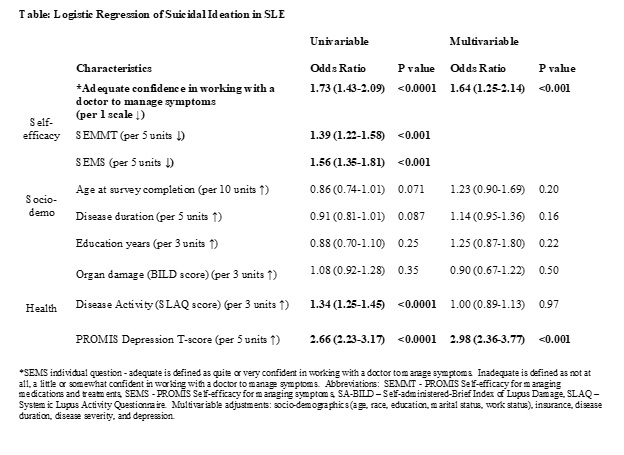Session Information
Session Type: Abstract Session
Session Time: 2:00PM-3:30PM
Background/Purpose: Suicidal ideation is more common in SLE than in other chronic diseases. Targeted interventions are needed to reduce morbidity and mortality. Bandura’s theory of self-efficacy notes the importance of individual perception of capabilities as predictors of health and well-being. Patients working with healthcare professionals to understand and manage symptoms is crucial. This study aimed to identify health and psychosocial factors associated with SI among patients with SLE, which could serve as possible targets for intervention by healthcare professionals. We explored the possible association between self-efficacy (SE) for managing symptoms and treatments and suicidal ideation (SI) among SLE patients from the Georgians Organized Against Lupus (GOAL) Cohort.
Methods: We examined data from the GOAL Cohort, a large population-based cohort of adults from metropolitan Atlanta, Georgia, who fulfilled three or more ACR classification criteria with a final SLE diagnosis by a board-certified rheumatologist. GOAL participants responded to validated self-administered tools on health outcomes. This study included participants with completed surveys between 2017- 2020. We explored the following measures: Patient Health Questionnaire-9, PROMIS Self-efficacy for managing medications and treatments (SEMMT) and PROMIS Self-efficacy for managing symptoms (SEMS), PROMIS depression, the Systemic Lupus Activity Questionnaire (SLAQ), and the Self-administered Brief Index of Lupus Damage (SA-BILD). We examined an individual SEMS question for further examination: I can work with my doctor to manage my symptoms with response choices on a Likert scale from 1 (I am not at all confident) to 5 (I am very confident). Logistic regression was used to examine factors associated with SI.
Results: This study includes data from 967 SLE participants (94% women, mean age 32 years [SD 11.8], 82% Black, mean disease duration 15 years [SD 10.3], 14% uninsured). The mean disease activity and organ damage scores were 15 (SD 8.8) and 4 (SD 3.7), respectively. The t-scores for SEMMT and SEMS were 46 [SD 8.9] and 48 [SD 8.7], respectively. Ninety participants (9.4%) endorsed suicidal ideation.
Univariate analyses showed that lower SE, higher SLE activity and higher depression scores were significantly associated with SI. In the multivariate analysis, only lower SE related to working with doctors to manage symptoms remained significantly associated with suicidal ideation after controlling for other factors (Table).
Conclusion: In a population-based, predominantly Black SLE cohort with considerable disease activity, there was a significant proportion of suicidal ideation. After controlling for other risk factors, such as socio-demographics and disease status, those with low self-efficacy for working with doctors to manage symptoms were at higher risk for SI. Health professionals can consider assessing and addressing perceptions of self-management capabilities among patients with SLE in order to improve outcomes in this vulnerable population.
To cite this abstract in AMA style:
Dunlop-Thomas C, Bao G, Williams J, Mozee H, Drenkard C, Lim S. Suicidal Ideation and Self-Efficacy in Systemic Lupus Erythematosus: Georgians Organized Against Lupus (GOAL) Cohort [abstract]. Arthritis Rheumatol. 2023; 75 (suppl 9). https://acrabstracts.org/abstract/suicidal-ideation-and-self-efficacy-in-systemic-lupus-erythematosus-georgians-organized-against-lupus-goal-cohort/. Accessed .« Back to ACR Convergence 2023
ACR Meeting Abstracts - https://acrabstracts.org/abstract/suicidal-ideation-and-self-efficacy-in-systemic-lupus-erythematosus-georgians-organized-against-lupus-goal-cohort/

